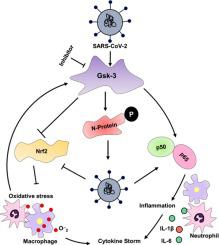Cytokine & Growth Factor Reviews ( IF 9.3 ) Pub Date : 2020-08-25 , DOI: 10.1016/j.cytogfr.2020.08.002 Anil Kumar Rana 1 , Shubham Nilkanth Rahmatkar 1 , Amit Kumar 1 , Damanpreet Singh 1

|
The coronavirus disease 19 (COVID-19) outbreak caused by Severe Acute Respiratory Syndrome Coronavirus 2 (SARS-CoV-2) had turned out to be highly pathogenic and transmittable. Researchers throughout the globe are still struggling to understand this strain's aggressiveness in search of putative therapies for its control. Crosstalk between oxidative stress and systemic inflammation seems to support the progression of the infection. Glycogen synthase kinase-3 (Gsk-3) is a conserved serine/threonine kinase that mainly participates in cell proliferation, development, stress, and inflammation in humans. Nucleocapsid protein of SARS-CoV-2 is an important structural protein responsible for viral replication and interferes with the host defence mechanism by the help of Gsk-3 protein. The viral infected cells show activated Gsk-3 protein that degrades the Nuclear factor erythroid 2-related factor (Nrf2) protein, resulting in excessive oxidative stress. Activated Gsk-3 also modulates CREB-DNA activity, phosphorylates NF-κB, and degrades β-catenin, thus provokes systemic inflammation. Interaction between these two pathophysiological events, oxidative stress, and inflammation enhance mucous secretion, coagulation cascade, and hypoxia, which ultimately leads to multiple organs failure, resulting in the death of the infected patient. The present review aims to highlight the pathogenic role of Gsk-3 in viral replication, initiation of oxidative stress, and inflammation during SARS-CoV-2 infection. The review also summarizes the potential Gsk-3 pathway modulators as putative therapeutic interventions in combating the COVID-19 pandemic.
中文翻译:

糖原合酶激酶 3:对抗严重急性呼吸系统综合症冠状病毒 2 (SARS-CoV-2) 大流行的推定靶点
由严重急性呼吸系统综合症冠状病毒 2 (SARS-CoV-2) 引起的冠状病毒病 19 (COVID-19) 爆发已证明具有高致病性和可传播性。全球的研究人员仍在努力了解这种菌株的攻击性,以寻找对其控制的推定疗法。氧化应激和全身炎症之间的串扰似乎支持感染的进展。糖原合酶激酶 3 (Gsk-3) 是一种保守的丝氨酸/苏氨酸激酶,主要参与人体细胞增殖、发育、应激和炎症。SARS-CoV-2的核衣壳蛋白是一种重要的结构蛋白,负责病毒复制,通过Gsk-3蛋白干扰宿主防御机制。病毒感染的细胞显示出活化的 Gsk-3 蛋白,该蛋白会降解核因子红细胞 2 相关因子 (Nrf2) 蛋白,从而导致过度氧化应激。活化的 Gsk-3 还可以调节 CREB-DNA 活性、磷酸化 NF-κB 并降解 β-连环蛋白,从而引发全身炎症。这两种病理生理事件、氧化应激和炎症之间的相互作用增强了粘液分泌、凝血级联和缺氧,最终导致多器官衰竭,导致感染患者死亡。本综述旨在强调 Gsk-3 在 SARS-CoV-2 感染期间在病毒复制、氧化应激起始和炎症中的致病作用。











































 京公网安备 11010802027423号
京公网安备 11010802027423号